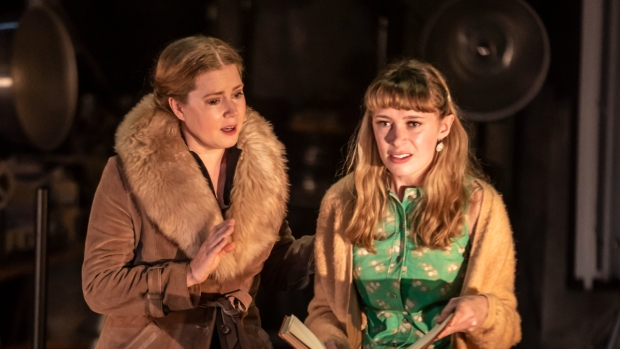The Glass Menagerie review – Amy Adams glistens in a gentle production
Jeremy Herrin directs this new West End revival

© Johan Persson
Only five years after the last appearance of The Glass Menagerie at the very same Duke of York's Theatre, but reloaded with the gunpowder of the draw of a new (and very young for this role!) star with Amy Adams, this production murmurs rather than sparks. It has a couple of tricks up its sleeve, but largely, Jeremy Herrin's production is dedicated to preserving the sense of smallness of this story, the earliest success for Tennessee Williams.
As Amanda Wingfield, the southern matriarch concerned with the future of her children above all else, Adams is like an irate, bustling dormouse, folding her paws to herself or endlessly fidgeting. This production dials up the fondness for her old-worldly character: her querulously thin voice works, with just how still everything else is. More force would overwhelm things. Tom Glynn-Carney is a gravely furious Tom Wingfield, achieving a good sibling rapport with Lizzie Annis as Laura, the painfully shy daughter devoted to her glass collection. Making her West End debut, Annis is quietly effective, giving a full body shudder at the knock at the door of the long-threatened gentleman caller, finding it hard to even look at him when they're sat together on the floor.
Victor Alli's Jim O'Connor, the perfect target for the family's quiet but furious desires, is a delight – he gets across just how ordinary and blameless a man this is, even if he is boisterous and convinced of his own ascendency. He goes off like a firework in Laura and Amanda's lives because Williams' play is concerned with small, unexceptional acts of carelessness, and the way people can respond: giving a salutary gift, perhaps, or running away.
Paul Hilton's role as the Narrator and older Tom Wingfield irresistibly recalls his dual role in The Inheritance: he's softly involved with things, usually present, often peering through the beautiful shelves of the glass menagerie itself to watch his family and himself. Sometimes he touches or answers the characters, but it's not overly-emphatic until the last scene – perhaps a difficult one to avoid, splitting his character with the younger Tom's like this.
All aspects of the design are in service of a fragile sense of muted memory, and they're drawn together well by Herrin. Video projections designed by Ash J Woodward take up much of the space. Yes, the photograph of the Wingfields absent father makes repeated appearance like clockwork, but so do images of the glass animals Laura collects, at kaleidoscopic angles as if light were shining through them, and all in warm tones suggestive of cave paintings, even the flickering shadows of pylons and fire escapes. It's hard to begrudge its earnestness, even if it's a little goofy.
Nick Powell's sensual, wistful composition often has a character begin a motif on the piano then immediately move it to be seemingly looped by a tape, as if always growing more distant. Vicki Mortimer's set design works with Herrin's direction for one beautiful, uncanny twist of perspective. Otherwise attention is focused on the menagerie, the assorted, set-suggesting lights of Paule Constable's lighting design at the edge of the stage, and Edward K Gibbon's lovely costumes. The trembling gown Adams dons for the night of O'Connor's visit is perfect.
It's altogether a cosier two and a half hours than you might expect: it's a production which handles its audience and characters carefully, unafraid of its own quietness. The lasting impression is more of a mood than any revelation. It passes over you like a dream, dissolving gently.












